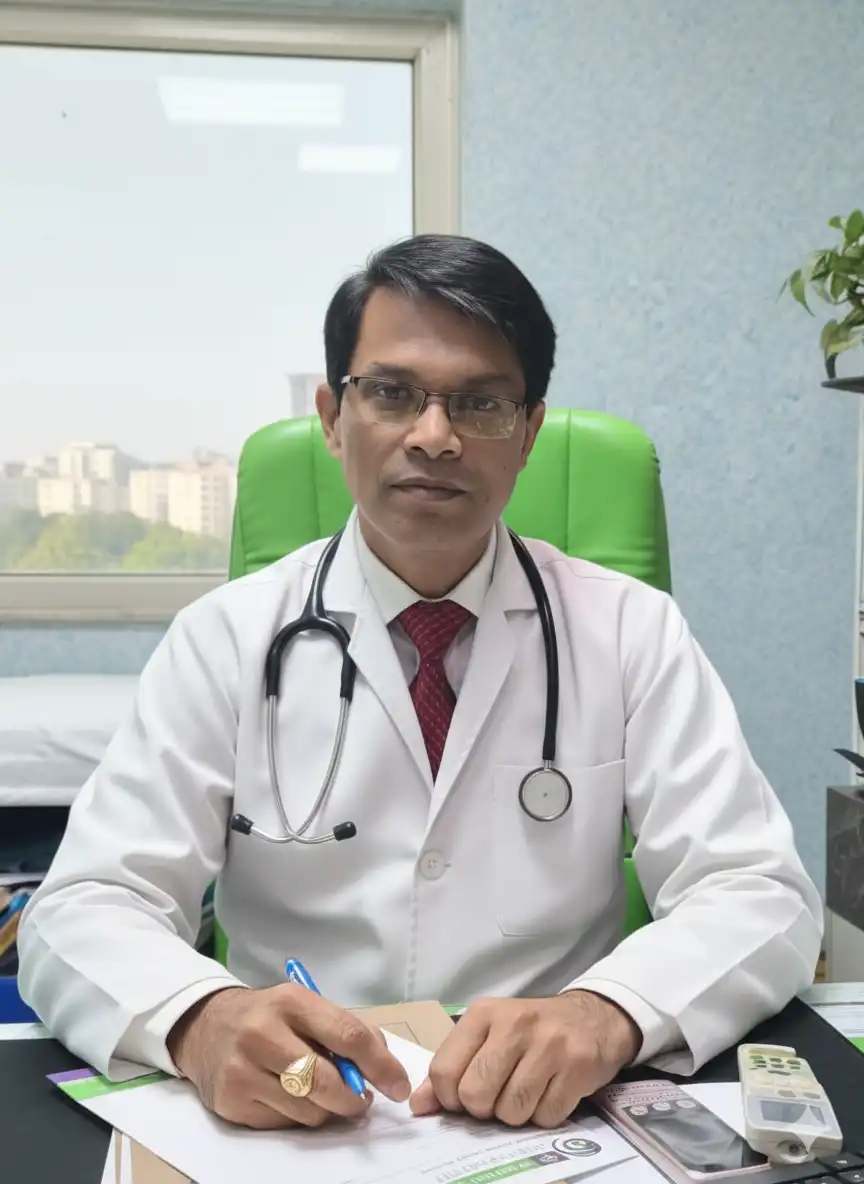
What is Parkinson’s Disease?
Parkinson’s Disease is a progressive neurological disorder that primarily affects movement. It occurs due to the gradual loss of dopamine-producing cells in the brain, leading to tremors, stiffness, slowness of movement, and balance issues. Non-motor symptoms like depression, sleep disturbances, and cognitive changes are also common.

- Caused by dopamine deficiency in the brain
- Leads to motor symptoms: tremor, rigidity, bradykinesia
- Non-motor symptoms: depression, anxiety, sleep problems
- Progressive and chronic in nature
- Homoeopathy focuses on improving overall vitality and reducing symptoms naturally
What are the main motor symptoms of Parkinson’s Disease?
Motor symptoms result from dopamine loss affecting movement. Common signs include resting tremors, bradykinesia (slowness of movement), rigidity (stiff muscles), postural instability, and difficulty walking. These symptoms interfere with daily activities and reduce independence over time.
- Tremors at rest
- Slowness of voluntary movements
- Muscle stiffness or rigidity
- Poor balance and coordination
- Homoeopathy can help reduce tremors, improve mobility, and maintain activity levels
What causes Parkinson’s Disease?
Parkinson’s Disease results from the degeneration of dopamine-producing neurons in the brain’s substantia nigra. Causes are multifactorial, including genetics, age, oxidative stress, environmental toxins, and lifestyle factors. While exact triggers vary, early intervention helps manage symptoms effectively.
- Dopamine deficiency in the brain
- Genetic predisposition may contribute
- Environmental toxins or chemicals
- Ageing and oxidative stress
- Homoeopathy addresses imbalance, enhances nerve health, and alleviates symptoms
What are the main motor symptoms of Parkinson’s Disease?
Motor symptoms result from dopamine loss affecting movement. Common signs include resting tremors, bradykinesia (slowness of movement), rigidity (stiff muscles), postural instability, and difficulty walking. These symptoms interfere with daily activities and reduce independence over time.
- Tremors at rest
- Slowness of voluntary movements
- Muscle stiffness or rigidity
- Poor balance and coordination
- Homoeopathy can help reduce tremors, improve mobility, and maintain activity levels
What are the early signs of Parkinson’s Disease?
Early signs of Parkinson’s Disease are often subtle and may go unnoticed. Common initial symptoms include slight tremors in one hand, stiffness, slow movements, reduced facial expressions, and changes in handwriting. Non-motor symptoms like sleep disturbances, constipation, and mood changes may also appear early.
- Slight hand tremors or shaking
- Muscle stiffness or rigidity
- Slowed voluntary movements (bradykinesia)
- Reduced facial expression or speech changes
- Homoeopathic remedies help in early-stage symptom management and improve the quality of life
What are the 5 stages of Parkinson’s Disease?
Parkinson’s Disease progresses through five stages, ranging from mild symptoms to severe disability. Stage 1 shows mild tremors; Stage 2 affects both sides of the body; Stage 3 causes balance problems; Stage 4 limits daily activities; Stage 5 requires full-time care. Early detection improves management.
- Stage 1: Mild, one-sided symptoms
- Stage 2: Bilateral symptoms, daily life slightly affected
- Stage 3: Balance issues, moderate disability
- Stage 4: Severe disability, needs assistance
- Stage 5: Full-time care, bedridden
- Homoeopathy supports symptom relief at all stages
How is Parkinson’s Disease diagnosed?
Parkinson’s Disease is diagnosed mainly through clinical evaluation. Doctors assess medical history, motor symptoms, tremors, rigidity, and balance issues. No single test confirms Parkinson’s. Imaging, like MRI or dopamine transporter (DAT) scans, may support diagnosis. Early detection allows timely management and homoeopathic support for symptoms.
- Physical and neurological examination
- Tremors, rigidity, bradykinesia assessment
- Medical history evaluation
- DAT scan or an MRI can aid in diagnosis
- Homoeopathy provides symptomatic relief and supports overall nerve health
How do doctors confirm Parkinson’s Disease?
Doctors confirm Parkinson’s Disease through detailed neurological exams, observing tremors, rigidity, bradykinesia, and posture. Response to medications like Levodopa may also support the diagnosis. Imaging may assist in uncertain cases. Homoeopathy can complement conventional care by reducing symptoms and enhancing patient vitality.
- Neurological examination is primary
- Motor symptoms assessment
- Response to Parkinson’s medication considered
- Imaging supports diagnosis
- Homoeopathy improves movement, sleep, and emotional well-being
Who is most at risk of Parkinson’s?
Parkinson’s primarily affects people over 60, though younger individuals may also develop it. Men are slightly more prone than women. Genetic factors, exposure to toxins, head injuries, and certain lifestyle factors may increase the risk of developing Parkinson’s Disease.
- Age above 60 is high-risk
- Men are slightly more affected
- Family history increases susceptibility
- Exposure to pesticides or chemicals
- Homoeopathy helps improve resilience and manage early symptoms
Can lifestyle cause Parkinson’s?
Lifestyle alone is unlikely to cause Parkinson’s Disease. However, exposure to toxins, certain chemicals, prolonged stress, poor diet, and lack of physical activity can contribute to disease progression and exacerbate symptoms.
- A sedentary lifestyle affects brain health
- Toxin exposure may worsen the risk
- Stress and poor sleep are contributory factors
- Healthy habits may slow progression
- Homoeopathy combined with lifestyle improvements can support overall neurological health
Can young people get Parkinson’s Disease?
Yes, young-onset Parkinson’s occurs before age 50. It often progresses more slowly but may affect family life, career, and emotional well-being. Early recognition and holistic care, including homoeopathy, can improve quality of life.
- Young-onset Parkinson’s <50 years
- Symptoms similar to older patients
- Slower progression common
- Impacts daily life and career
- Homoeopathy provides gentle, individualised symptom support
Does Parkinson’s cause memory loss?
Memory loss is a possible non-motor symptom of Parkinson’s, usually in later stages. Patients may experience difficulty with attention, planning, or recalling information. Early management and homoeopathic remedies may help improve cognitive function and slow memory decline.
- Mild memory problems early on
- Cognitive decline may progress with the disease
- Difficulty concentrating and planning
- Supportive therapies improve function
- Homoeopathy aids cognitive clarity and mental health
What foods should Parkinson’s patients avoid?
Parkinson’s patients should limit high-protein meals during Levodopa intake, processed foods, excessive caffeine, and alcohol. A balanced diet with fruits, vegetables, whole grains, and healthy fats supports brain health. Homoeopathy complements diet by improving digestion, energy, and overall well-being.
- Avoid high-protein meals with medications
- Reduce processed foods and preservatives
- Limit caffeine and alcohol
- Eat fibre-rich fruits and vegetables
- Homoeopathy enhances energy, digestion, and nervous system health
Can Parkinson’s be treated with homoeopathy?
Yes, homoeopathy can be an effective supportive treatment for Parkinson’s Disease. Individualised remedies help reduce tremors, rigidity, bradykinesia, sleep disturbances, depression, and anxiety. Homoeopathy focuses on overall energy, improving quality of life, and complementing conventional treatments.
- Reduces tremors and stiffness
- Supports motor and non-motor symptoms
- Improves sleep and mood
- Enhances vitality and energy
- Works alongside medications and physiotherapy
Why choose Dr. Sanjay’s Homoeopathy for Parkinson’s Disease treatment in Lucknow, India?
Dr. Sanjay’s Homoeopathy is a trusted clinic for safe and effective Parkinson’s Disease treatment in Lucknow, India. With years of expertise, Dr. Sanjay provides specialised Parkinson’s Disease homoeopathic treatment in Lucknow, India, that helps manage tremors, muscle stiffness, slowness of movement, and balance issues naturally without side effects. As a leading homoeopathic doctor in Lucknow, he follows international treatment standards and offers personalised care that focuses on improving nerve health, reducing symptoms, and enhancing the quality of life for patients. Patients choose Dr. Sanjay’s Homoeopathy for its holistic healing, long-lasting relief, and compassionate approach in managing neurodegenerative conditions like Parkinson’s Disease.


